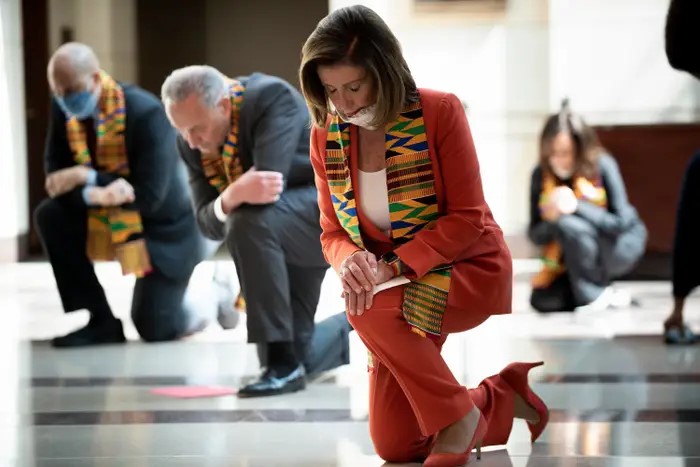Who’s afraid of black nationalism?
America’s leftist elites regard white American nationalism as their principal ideological adversary. But they have another adversary that is often overlooked: black American nationalism.
Black American nationalism is very easy to overlook, here in the third decade of the new millennium. Although it has had its day in the sun—even Lincoln was in favor of it, once upon a time—its best-known proponent since the Civil Rights Era, Malcolm X, died 56 years ago, at the hands of rival black nationalists, and the movement seems to have gone only downhill since. Already by the mid 1970s Richard Pryor was mocking the “Back to Africa Movement” in his stand-up routines. Black American nationalism also has been tainted (or so one is supposed to think) by the moral support it has occasionally received from overtly white supremacist organizations. In any case, although there must still be millions of black Americans of the nationalist persuasion out there, their movement has by now been relegated to the fringes—the black nationalists who make the news these days seem mostly violent, deranged and disorganized.
By contrast, black American activism that is not nationalist seems to have been doing pretty well lately, judging by the recent wildfire contagions of enthusiasm for BLM, the 1619 Project, the George Floyd hagiology, and Critical Race Theory. Last year, leading Democrats actually donned kente cloth stoles and bent a knee on the US Capitol’s marble floor during the announcement of police reform legislation, as if genuflecting to a Justifiably Angry Black God.

Non-nationalist black activists also seem to have been doing pretty well for themselves personally. Consider Patrisse Khan-Cullors, a co-founder of BLM, whose income as an activist has enabled her recently to purchase several homes collectively worth several millions of dollars. Or Nikole Hannah-Jones, of the 1619 Project, with her consulting, if that’s what one should call it, for Shell and other large corporations, and her remarkable habit of promoting products in interviews and speeches. Or the so-called family of George Floyd, with their $27 million payout from the city of Minneapolis. Or Stacey Abrams with her novel and its lucrative adaptation for TV. Or Ta-Nehisi Coates with his comic books and film scripts. Or reparations-demander Ibram X. Kendi with the miraculous largesse he attracts from wealthy whites.

Now, granted, some of this flow of wealth to activists could be framed as prudent purchases of insurance by white-run organizations—inoculations against the cooties of “racism” and “white supremacy” that can afflict, and cancel, any prominent organization if it’s not careful.
But even moreso I think this wealth transfer reflects elites’ desire to reward and incentivize those who tamely do their bidding.
Malcolm X viewed elite-approved “black leaders” in his day with similar skepticism. He famously called Martin Luther King Jr. a chump and a stooge of white liberals for promoting the idea of peaceful integration within white America—an idea that to him was an empty promise, aimed as always at perpetuating white control of blacks.
I think he was basically right about that. And if contemporary America’s leftist elites have banished black nationalists to the fringes, and have instead anointed a bunch of racial-equity grifters as the approved “leaders” of black America, then surely black nationalism is something that Legacy Americans should support as energetically as they can.
I’m not just being enemy-of-my-enemy tribalistic here. I’m trying to be coldly logical. The leftist elites of the US, which is to say the leaders of the Democratic Party and their allies and henchwomen in academia, media, entertainment, big business, etc., need to keep American blacks in the country and on their side for the most basic electoral reasons. They cannot abide a black separatism that would lead to a new, black nationalist political party or—the elites’ ultimate nightmare—a substantial black exodus from the US to a new homeland, even an internal one. Obviously, such an exodus would, among its many consequences, fatally weaken those leftist elites, in part by removing most of the radioactive core that powers their racial-factionalist ideology.
There is also a strong moral argument here. African-Americans of today are descendants of West Africans who were brought to the New World against their will. Theirs is a population that was literally enslaved for a long time, and then was oppressed for a long time after that. Even as their oppression has eased it has become clear that they are, for the most part, trapped in a world not of their making. In other words, for all this time they have been denied the basic rights of ethnic nationhood and self-determination that most peoples around the world have traditionally enjoyed. The fact that European-derived whites, with their hyperverbal brains and their sentimental, empire-adapted ideology, have overwritten ancient wisdom about the primacy of ethnic nationhood and self-determination, and no longer consider it important, is—American blacks might say, with some heat—not their problem.
It shouldn’t be their problem, anyway. And yet it is. And it’s not just their problem, is it? This idea that nations should be substantially multi-racial/ethnic (“multicultural”), bound merely by civic nationalism, economic opportunism, and kumbayah songs, is really the ur-problem, the most deeply planted seed of destruction, in the United States and most other Western countries. This idea seems essentially Christian in origin, but was also elaborated in response to the circumstances of the modern West, including colonialism and the globalization of trade and labor. In the US, it was shaped inter alia by the issues surrounding the Civil War, and was used, e.g., to justify turning African slaves into Union soldiers and then Republican voters in the Reconstruction South.
Despite multiculturalism’s clash with traditional ways of organizing societies, and its century and a half of failure in the US, it persists—persists even as racial/ethnic factionalism ravages the country, burns its cities, corrupts its democracy, and ruins its quality of life.
Even worse, multiculturalism’s elite proponents have become ever more suppressive of traditional ethnonationalism—declaring it “white supremacy” if favored by whites—even as they openly stoke nonwhites’ racial/ethnic grievances to build their political factions.
So black American nationalism is really only one of a thousand notions rendered unacceptable by America’s multiculturalist cult—whose mindset has managed to colonize both of the major political factions, and has successfully compensated for its evidentiary shortcomings with an hysterical, Inquisitionist crushing of dissent.
Nevertheless, black American nationalism does have advantages that make it a more practical aim amid this woke, antinationalist Inquisition. For one thing, it’s about what American blacks want, and if they declare they want to live apart and self-governing, the elites have no good alternative to the granting of that wish. Again and again those elites have declared American blacks holy and inviolable. Even if the elites’ motive in saying so has been only political and expedient, many blacks, and liberal whites, have taken the assertion at face value.
Another practical advantage that should make black nationalism more viable as a white cause is that American whites, I guess for reasons relating to their Christian backgrounds, prefer to think of themselves as helping others, not as acting selfishly for their own benefit. What could be more unselfish than to carve out thousands of square miles from their fair land, and donate it to their black brothers and sisters, to give them a new and truer freedom?
Would the blacks who lived in such a country experience a decline in living standards? I expect that they would, at least initially and in material terms. But as naïve as it may seem for me to say so, the issue here really goes deeper than material considerations: It’s about self-determination and human dignity. There are about fifty million black descendants of slaves living in the United States, enough to form one of the world’s most populous countries, and in many ways they have made clear that they are a distinctive people who prefer their own kind to others. The claim that they must nevertheless be the permanent captives and pawns of one political faction or another, in a society of European origin that is majority nonblack—a society that also jails them at sky-high rates—is actually ludicrous. It is one of the many toxic lies Americans foolishly think they can continue to live with.
***

